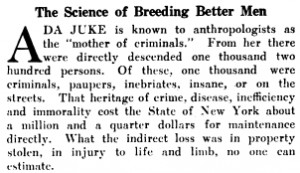People who advance ‘eugenic’ ideas while trying to assert that what they are proposing is not ‘eugenics’ at all, but rather a straight-forward inference from evolutionary science, fail to understand that the eugenicists themselves believed they were simply making a straight-forward inference from Darwinism. And, indeed, it is a straight-forward inference, which is why so …
Category: breeders
Scientific American: “The Science of Breeding Better Men” 1911
Editorial from a 1911 edition of Scientific American [Source]: Sci-Am’s Editor’s note: This editorial was written and published in 1911. Although our editors of a century ago pondered some lofty aspirations for the orderly future of humans, it was only three decades later that the brutal reality of a Nazi social order suffused with a …
The Human Betterment Eugenics Society Hides Its Identity
One of the reasons why people fail to understand how much of what the are dealing with today is actually derived from eugenics principles (if not from eugenics organizations, directly!) is because the eugenicists that got things started changed the names of their organizations in a deliberate attempt to distance themselves from the atrocities of …
Julian Huxley: Population Control, Eugenics, and Birth Control all part of the same Program
Contemporary advocates for birth control exhibit no awareness whatsoever that birth control was always conceived in the context of ‘eliminating the unfit,’ ie., eugenics. Eugenics, in turn, was considered a straight-forward logical extension of Darwinism. Eugenics was seen as human control of human evolution, and was always tied into discussions on ‘population control.’ These are …
Excerpt: Darwin’s Dilemma as told by Bertrand Russell, from Designing Babies
From Designing Babies: The Brave New World of Reproductive Technology by Roger Gosden. W.H. Freeman and Company, New York. 1999. Page 3-4 According to Darwin’s theory, natural selection decides which individuals are fit to survive and breed. So powerful was this idea that it quickly engaged not only fellow biologists but also intellectuals who were …
Julian Huxley: The History of Population Control–Malthus and Darwin and Birth Control
Today, one can hear people talking endlessly about ‘birth control’ without remembering that just a few decades ago, it was synonymous with ‘population control’ (see this excerpt from the same book quoted below) and that the population control advocates themselves saw themselves as merely applying the laws Malthus discovered and Darwin proved–the very same outlook …
Charity a Hindrance to Natural Selection
In the following foreword from a compilation of 12 eugenic lectures (1914), we see that eugenics is perceived as merely applied evolution. Furthermore, ‘modern man,’ being a sympathetic being, keeps alive those that should die. With luck, principles of breeding already used with animals will be brought to bear on humans. ——————- Foreword by Lewellys …
Guy Irving Burch: Darwin, Eugenics, and War
Guy Irving Burch was a staunch eugenicist and early advocate for population control on both environment grounds and eugenic grounds. He rests his arguments explicitly on Darwin and Malthus, as this introduction to chapter 4 of his Human Breeding and Survival: Population Roads to Peace or War illustrates (pg 40). ————————- Chapter Four Freedom from …
On the Elimination of Defectives: Hitler, in Mein Kampf
Note the utilitarian appeal to the reduction of suffering, the appeal to the ‘common good’, and the basic belief that all he is doing is applying biological principles. Hitler, in Mein Kampf. [Source] In this field the People’s State will have to repair the damage that arises from the fact that the problem is at …
Francis Galton Coins the Word ‘Eugenics’ as the Science of Better Breeding: Men, Brutes, and Plants. Quote of the Day
A little known fact is that eugenics was seen as the application of principles of heredity, in particular those principles as understood by Darwin. In this excerpt, Francis Galton (Darwin’s cousin), coins the word eugenics and explicitly refers to it as a science. The principles of heredity thus applied, he says, are “applicable to men, …


Recent Comments